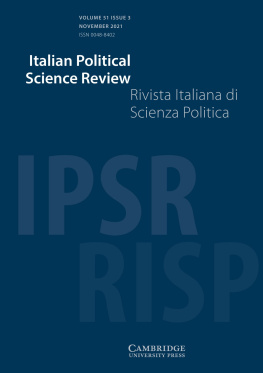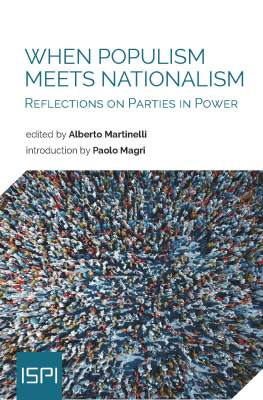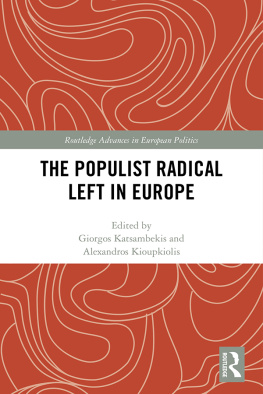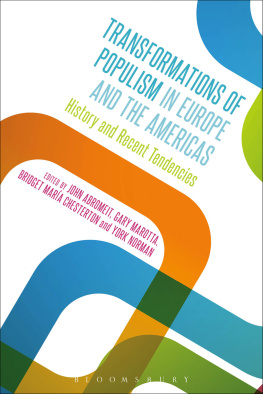Sovereignism and Populism
At a time when populism and appeal for national and popular sovereignty are on the rise in Europe, the USA, and beyond this volume proposes a new research agenda in political science that focuses on the linkages between populist and sovereignism in Europe.
The books core question is to know and describe whether, how, and to what extent populism has been able to articulate the calls for taking back control of the national borders and authority, by looking at both the demand and supply sides. Through compelling empirical analyses, the authors offer fresh data and theoretical insights on the determinants of the support for sovereigntist claims and its impact on voting choices, as well as on the features of the sovereignist discourse in populist parties.
Coupled with the growing electoral success of party-based populism, sovereignism actually poses challenges to the ongoing processes of supranational integration. This urges a timely rethinking of democratic politics and calls for far-sighted alternatives to taking back control to address the impact of globalisation and regionalisation on contemporary societies.
The chapters in this book were originally published as a special issue of the journal, European Politics and Society.
Linda Basile is Research Fellow at the Department of Social, Political, and Cognitive Sciences of the University of Siena, Italy.
Oscar Mazzoleni is Professor in Political Science and Director of the Research Observatory of Regional Politics at the University of Lausanne, Switzerland.
First published 2022
by Routledge
2 Park Square, Milton Park, Abingdon, Oxon, OX14 4RN
and by Routledge
605 Third Avenue, New York, NY 10158
Routledge is an imprint of the Taylor & Francis Group, an informa business
, Conclusions 2022 Taylor & Francis
Chapter 1 2019 Reinhard Heinisch, Annika Werner and Fabian Habersack. Originally published as Open Access.
With the exception of Chapter 1, no part of this book may be reprinted or reproduced or utilised in any form or by any electronic, mechanical, or other means, now known or hereafter invented, including photocopying and recording, or in any information storage or retrieval system, without permission in writing from the publishers. For details on the rights for Chapter 1, please see the chapters Open Access footnote.
Trademark notice: Product or corporate names may be trademarks or registered trademarks, and are used only for identification and explanation without intent to infringe.
British Library Cataloguing-in-Publication Data
A catalogue record for this book is available from the British Library
ISBN13: 978-1-032-14814-4 (hbk)
ISBN13: 978-1-032-14815-1 (pbk)
ISBN13: 978-1-003-24125-6 (ebk)
DOI: 10.4324/9781003241256
Typeset in Myriad Pro
by codeMantra
Publishers Note
The publisher accepts responsibility for any inconsistencies that may have arisen during the conversion of this book from journal articles to book chapters, namely the inclusion of journal terminology.
Disclaimer
Every effort has been made to contact copyright holders for their permission to reprint material in this book. The publishers would be grateful to hear from any copyright holder who is not here acknowledged and will undertake to rectify any errors or omissions in future editions of this book.
INTRODUCTION Sovereignist wine in populist bottles?
Linda Basile

and Oscar Mazzoleni

ABSTRACT
Sovereignist claims are on the rise in Europe, the USA, and beyond. In dealing with processes such as globalization and supranational integration, which have progressively shifted powers and competencies away from nation states, these transformations have created a fertile terrain for reactions against the sources of such insecurity, which find full expression in the sovereignist claims to take back control, that is to say to return to the traditional understanding of sovereignty being based upon mutually exclusive territories. These sources of insecurity and social unrest have also provided structures of political opportunity for the electoral success of populist parties. Despite its relevance for the understanding of the populist discourse, however, sovereignty has been largely under-theorised by scholars dealing with populism. Accordingly, we propose a new research agenda to study populist mobilization that focuses on the linkage between populism and sovereignism, while also encouraging further theoretical and empirical studies, focusing on both the demand side and the supply side. In particular, we suggest some crucial aspects with which the Special Issue seeks to engage, before pointing to some substantial implications that are likely to emerge from the findings of this research agenda.
1. Introduction
In recent decades, across Europe as well as on the other side of the Atlantic, several actors labelled as populist have achieved significant electoral results and have even succeeded in coming to power by appealing to the national people and the disadvantaged, as opposed to supranational institutions, the EU, the global economy, the elites, and the foreign threat. (, p. 299). The seemingly recurrent reference to sovereignism in the populist discourse raises two questions: How do populism and sovereignism relate to each other? Could sovereignism be adopted as a notion to better grasp the nature of populist mobilization?
In this contribution, we will seek to address these questions, while suggesting theoretically grounded insights for a research agenda that explores the linkages between sovereignism and populism. It is organized as follows: In the first and second sections, respectively, we will examine the concept of sovereignty and the current socio-political challenges to nation-states on which sovereignist claims rely. These will provide, in the third section, the theoretical underpinnings regarding the relationship between sovereignism and populism; we will then propose, in the fourth section, a number of issues for a new research agenda aimed at addressing such a close relationship. In the final section, we will briefly introduce the papers included in the present Special Issue, which, by adopting different perspectives and methodological approaches, provide a valuable theoretical and analytical contribution to the development of such a research agenda.
2. Sovereignty: from the modern-state's conceptualization to the contemporary transformations
Sovereignty is an old, yet changing and constantly evolving concept. Alongside the concept of sovereignism, it has long been addressed by several disciplines, including legal studies, political theory, geography, and international relations; in political science, on the other hand, sovereignty has often been considered as a proxy for Westphalian state, or nation-state institutional authority (representative democracy, on which liberal democracies rely.
However, the social, economic, and political processes unfolding since the aftermath of World War 2 and, above all, the fall of the Berlin wall in 1989, have jeopardized such cornerstones of modern sovereignty in contemporary democracies. As some scholars have pointed out, the European nation-states that emerged as core units of the international system within the Westphalian paradigm and were consolidated throughout the nineteenth and early twentieth century, have gradually weakened their sovereignty ().











 and Oscar Mazzoleni
and Oscar Mazzoleni